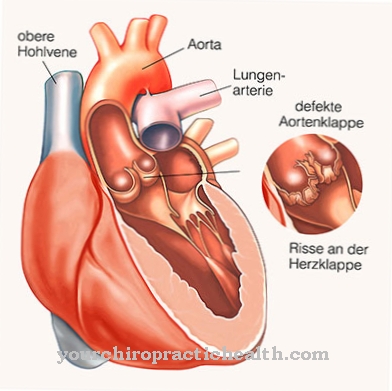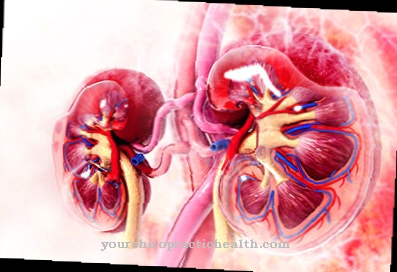At the Oral thrush it is a fungal infection of the oral mucosa. Popularly this disorder is also often used Mouth fungus called. People with a weakened immune system and babies are particularly at increased risk of developing oral thrush.
What is oral thrush?

© zilvergolf - stock.adobe.com
Oral thrush affects the lining of the mouth. In the normal oral flora there are a large number of microorganisms, such as bacteria and fungi. However, these do not cause any damage. In addition, there are also bacteria, viruses and fungi that trigger diseases if they can penetrate the oral mucous membranes. This also includes the causative agent of oral thrush, a yeast fungus. Based on the pathogen, the disease is therefore often referred to as mouth fungus.
The triggering yeast can spread very quickly in the body and migrate from the oral mucosa to the throat, from where it can also affect the esophagus up to the stomach and intestines. Therefore, oral thrush should be treated as quickly as possible.
causes
Oral thrush is caused by an infection with a yeast fungus. In most cases it is Candida albicans, a very widespread pathogen from the yeast family. But Candida tropicalis and Candida stellatoidea also trigger oral thrush.
However, not everyone who comes into contact with one of these pathogens will also develop oral thrush. For the disease to break out, the body's immune system must be weakened. Because of this, there are different risk groups that are considered to be particularly at risk for oral thrush. This mainly includes infants, the elderly and patients with chronic diseases that cause a weak immune system.
In people with an intact immune system, the pathogen has no chance of causing the disease. The pathogen is recognized and fought very quickly by the immune system.
Symptoms, ailments & signs
Depending on the form, oral thrush can cause different signs and symptoms. Pseudomembranous candidiasis is manifested by a white, easily wipeable coating and an inflamed mucous membrane that is slightly reddened and painful to the touch. Acute erythematous candidiasis is associated with burning mucous membranes that are reddened in the area of the tongue.
Deposits normally do not occur with this form. In hyperplastic candidiasis, a white coating with red borders appears on the mucous membrane and tongue, which is difficult to peel off. The forms in which deposits form have in common that bleeding can occur if they are touched. Any form of candidiasis can spread quickly and pass into the throat.
Such a procrastination results in a sore throat and difficulty swallowing. In severe cases, oral thrush spreads to the esophagus and through it to the gastrointestinal tract. This can lead to stomach cramps, heartburn and nausea.
This is accompanied by general symptoms such as fever, fatigue and severe malaise. If the candidiasis is confined to the oral cavity, there are no major complications. The changes in the mucous membrane usually subside once the infection has subsided.
Diagnosis & course
A whitish coating on the oral mucosa and in the throat area is typical for oral thrush. However, this does not necessarily have to occur, there may also be reddened oral mucosa. In addition, there may be a burning sensation in the mouth.
To make a diagnosis, a detailed discussion between the doctor and the patient is necessary. This is followed by a physical examination in which the oral mucosa is examined in detail.
Very often there is also an unpleasant bad breath caused by the fungus with oral thrush. The lymph nodes can also be swollen.
Oral thrush hardly causes pain, but the sensitive infants can experience this differently and in the worst case stop eating. It is therefore very important that treatment is initiated quickly. Also to prevent the disease from spreading.
Complications
In most cases, this condition can be treated relatively well and easily so that it does not cause serious complications or other symptoms. Those affected mainly suffer from severe discomfort in the mouth. The result is a dry mouth and thus an increased thirst.
Sometimes a coating appears on the tongue and patients usually suffer from bad breath. Burning of the tongue can also occur and the patient's taste perception is clearly disturbed by the disease. The quality of life is significantly reduced by the disease. There may also be discomfort when taking liquids and food, as this is usually associated with pain.
This not only leads to deficiency symptoms, but also not infrequently to psychological complaints or depression. There are no further complications with the treatment itself. With the help of drugs or antibiotics, the disease can be defeated relatively easily.
In severe cases, other areas of the body may need treatment if the disease has spread to the stomach and intestines. As a rule, life expectancy is not reduced or restricted.
When should you go to the doctor?
Any occurrence of oral thrush in infants and young children is a reason to see a doctor. At this age, the immune system is still developing and, above all, the young patients need regular food. Because of the oral thrush, they may reject the breast or bottle or do not want their porridge, which can quickly weaken the immune system even further, so that the existing oral thrush can spread further. In adults, oral thrush usually only occurs when the immune system is severely attacked or certain antibiotics are taken.
In the case of a long-term disease that has weakened the immune system, adult patients should also see a doctor at the first symptoms of oral thrush and receive medication for it. This can prevent the oral thrush from spreading and causing uncomfortable symptoms. In addition, the doctor can use this opportunity to examine whether a nutritional deficiency is responsible for the oral thrush occurring in the first place.
A recurrence can then be prevented with suitable food supplements. Furthermore, it must be clarified whether the presumed diagnosis of oral thrush is not a tumor precursor that looks exactly the same and causes comparable symptoms. As a rule, however, this differential diagnosis only occurs in adults; in the case of small children, the first suspicion is usually correct.
Treatment & Therapy
To treat oral thrush, special drugs are used, so-called antimycotics, antifungal agents. These drugs come in different forms: lozenges, solutions, suspensions or as a gel. The active ingredients amphotericin B and nystatin are often used here. If the oral thrush is at an early stage, treatment with such drugs is sufficient and the symptoms will usually subside fairly quickly.
However, if the oral thrush is more advanced and has penetrated deeper into the body, this form of treatment with an antifungal drug is no longer sufficient. In addition to local use, the active ingredients must then also be taken orally so that they can reach the other affected parts of the body and fight the yeast infection there.
In any case, it is important to strictly adhere to the prescribed duration of treatment. Even if the symptoms have already subsided or have even completely disappeared, the medication should be taken until the end. Otherwise, there is a risk that the disease will re-bloom. In particularly stubborn cases, when the oral thrush cannot be contained or keeps reappearing despite long enough therapy, stronger antimycotics can be used. These penetrate into the gastrointestinal area and fight the yeasts there effectively.
If the patient is suffering from pain caused by oral thrush, additional pain relievers can be prescribed. Paracetamol is very often used here for oral thrush.
During the illness, great attention should be paid to hygiene. This is particularly important for babies. It is recommended to boil the teats from bottles and soothers daily and to replace them after the symptoms have healed.
You can find your medication here
➔ Medicines against tartar and tooth discolorationOutlook & forecast
Candida albicans infections are usually harmless and usually heal on their own within a few days. Almost everyone has oral thrush at least once in their life, but it goes away on its own. The causes are usually a temporary weakening of the immune system or a disruption of the natural oral flora, such as can be triggered by taking antibiotics.
Prolonged oral thrush occurs mainly in newborns, the elderly, or people with weakened immune systems in general. This can also lead to more severe courses with extensive and long-lasting inflammation in the oral cavity, whereby drug treatment may be necessary. This consists of the administration of antimycotics (e.g. nistatin or amphotericin B) and is usually successful within a few days.
If oral thrush recurs, it is important to find the cause of the disease and, if possible, to remedy it. Candida fungi can be found on the mucous membrane of most people, but only cause problems if other factors favor it. In immunocompromised patients, prophylactic use of antimycotics can help stop recurrent infections. Consequential damage from oral thrush is not to be expected.
prevention
Oral thrush can be prevented primarily with hygiene. People with dentures should exercise careful oral hygiene and clean the dentures after every meal. Corresponding hygiene measures also apply to infants. Pacifiers, bottle teats and toys that are regularly put in the mouth should be cleaned regularly. In the case of teats and pacifiers, all germs are killed by sterilization using a boil or a special device.
Aftercare
Follow-up care for oral thrush includes various approaches. First of all, it is important that patients do not stop taking the medication prematurely as soon as they see improvement. Because in numerous cases, many pathogens are still present when the oral thrush is no longer visible.
Therefore, the prescribed antifungal drugs must be taken for as long as the doctor has prescribed. Then it makes sense to have the attending physician perform a follow-up examination. Follow-up care also includes steps to prevent future outbreaks of oral thrush. For adults, this includes, for example, giving up tobacco consumption and compensating for existing nutritional deficiencies.
When using dentures or braces, care must be taken to ensure thorough hygiene. For infected babies, there are additional rules that must be observed by parents in particular. Pacifiers and other toys that babies put in their mouths must be meticulously cleaned on a regular basis.
In addition, parents should make sure that their own saliva does not come into contact with the child's mouth or their toys, as this can also lead to new infections. If oral thrush occurs frequently, it makes sense to have regular check-ups with your doctor so that you can intervene in good time by administering medication. A preventive administration of antimycotics is then also possible.
You can do that yourself
Simple measures that can be easily integrated into the daily routine make a significant contribution to the prevention or control of bacterial inflammation in the mouth area. Optimal oral hygiene and a healthy diet deprive fungi of their food and livelihood.
Brushing your teeth carefully, twice a day, and changing toothbrushes and dental care items are important cornerstones of good oral hygiene. Regular checks of the condition of the teeth by a dentist can be an important addition in the context of prevention. Wearers of dental prostheses can counteract fungal growth by daily checking the surface and proper fit of their prosthesis. Dentures can be cleaned with agents that are effective against fungi. For asthmatics, it is important to rinse the mouth carefully after using cortisone-containing sprays. After consulting your pulmonologist, you may reduce the dose of the drug.
Another building block in self-help is a healthy probiotic diet. If the diet is very sugary, mushrooms find optimal living conditions. It is therefore important for diabetics to regularly check the optimal setting of their blood sugar level. In general, switching to a low-sugar diet is recommended for oral thrush.
In addition to observing simple hygiene and dietary rules, taking medication for oral thrush according to the doctor's instructions is crucial - ending the therapy early can lead to relapse.

.jpg)






















.jpg)


